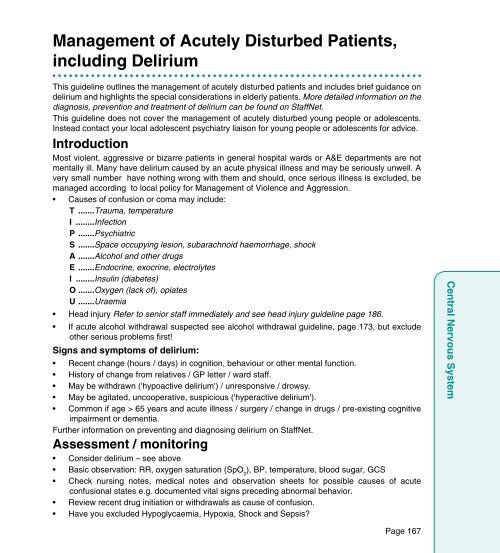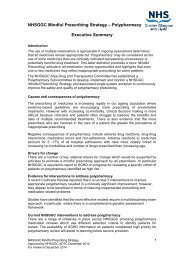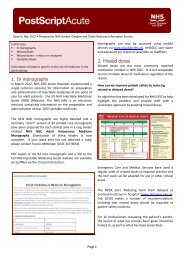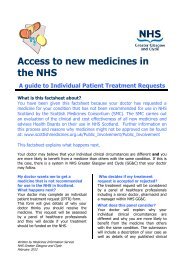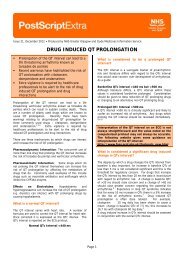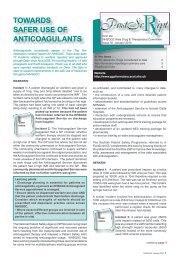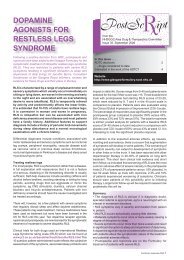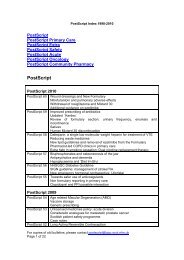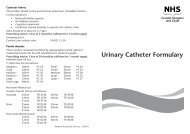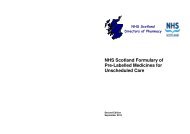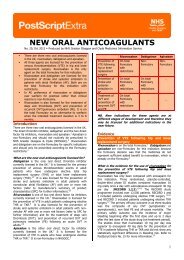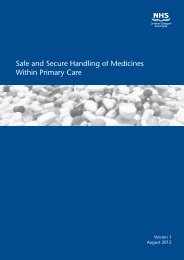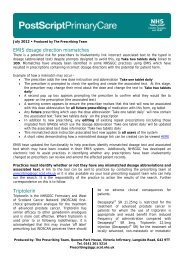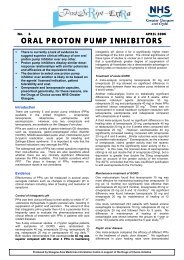- Page 4:
ContentsEditorial GroupAcknowledgem
- Page 8 and 9:
AppendicesAppendix 1 - Nicotine Rep
- Page 10 and 11:
AcknowledgementsA huge number of pe
- Page 12 and 13:
Summary of Major changes in Therape
- Page 14 and 15:
On discharge• As the discharge pr
- Page 16:
Other examples• Sevredol 10 mg ta
- Page 19 and 20:
Antiplatelets and anticoagulants:In
- Page 21 and 22:
non-Formulary medicines, a complete
- Page 23 and 24:
Quick guide to using the handbookWh
- Page 25 and 26:
Sections1. Resuscitation and Anaphy
- Page 27 and 28:
Section 1Resuscitation and Anaphyla
- Page 29 and 30:
Continued from previous page2. Adre
- Page 31 and 32:
Peri-arrest ArrhythmiasGeneral advi
- Page 33 and 34:
Broad QRS - continuedNarrow QRS - c
- Page 35 and 36:
Guidelines on Blood TransfusionThis
- Page 37 and 38:
Management of Major Haemorrhage(See
- Page 39 and 40:
Hospital Specific Information on Ma
- Page 41 and 42:
Table continued from previous pageG
- Page 43 and 44:
Assessment / MonitoringAKI stage I
- Page 45 and 46:
Section 2Drug Overdose and Toxicity
- Page 47 and 48:
Treatment of Paracetamol OverdoseTh
- Page 49:
Management of paracetamol overdose
- Page 52 and 53:
Lithium toxicityNormal range 0.4 -
- Page 54 and 55:
Management of DyspepsiaGastrointest
- Page 57 and 58:
Table continued from previous pageR
- Page 59 and 60:
Management of Gastroduodenal Ulcers
- Page 61 and 62:
Management of Upper Gastrointestina
- Page 63 and 64:
Post endoscopy continuedb. Arrange
- Page 65 and 66:
General management and treatment op
- Page 67 and 68:
- SAAG can differentiate ascites re
- Page 69 and 70:
General management and drug therapy
- Page 71 and 72:
Drug therapy• Unless contraindica
- Page 73 and 74:
Consider:• Serum caeruloplasmin,
- Page 75 and 76:
Section 4Cardiovascular SystemCardi
- Page 77 and 78:
Table 1 - Indicators of patients at
- Page 79 and 80:
Continued from previous pageIf the
- Page 81 and 82:
Diagnosis and Treatment of VenousTh
- Page 83 and 84:
Wells Clinical score should be util
- Page 85 and 86:
IV Drug Misusers• Given their cha
- Page 87 and 88:
Drug therapy / treatment options co
- Page 89 and 90:
RivaroxabanRivaroxaban is an oral d
- Page 91 and 92:
Diagnosis of VTE in pregnancy• If
- Page 93 and 94:
Referral of Patients to Anticoagula
- Page 95 and 96:
Reversal of Anticoagulant TherapyIn
- Page 97 and 98:
General management and drug therapy
- Page 99 and 100:
Elective admissions - Risk Stratifi
- Page 101:
Elective admissions - restarting an
- Page 104 and 105:
Suspected Acute Coronary Syndrome (
- Page 106 and 107:
If patient is for PPCI go to Box 1.
- Page 108 and 109:
Drugs for acute coronary syndrome /
- Page 110 and 111:
Secondary Prevention of Coronary He
- Page 112 and 113:
Cardiovascular SystemTroponin posit
- Page 114 and 115:
Atherosclerotic arterial disease is
- Page 116 and 117:
Algorithm for Cardioversion of AFSt
- Page 118 and 119:
Cardiovascular SystemVentricular ra
- Page 120 and 121:
Prevention of stroke / thromboembol
- Page 122 and 123:
Drugs for atrial fibrillation conti
- Page 124 and 125:
CPAP in cardiogenic pulmonary oedem
- Page 126 and 127: Management of HypertensionCardiovas
- Page 128 and 129: General management and drug therapy
- Page 130 and 131: Cardiovascular SystemGeneral manage
- Page 132 and 133: Management of Acute Stroke 3Transie
- Page 134 and 135: Secondary prevention of stroke and
- Page 136 and 137: Cardiovascular SystemPage 126
- Page 138 and 139: Guidelines for Blood Gas AnalysisRe
- Page 140 and 141: Respiratory SystemNext consider aci
- Page 142 and 143: Management of Acute Severe Asthmain
- Page 144 and 145: Management of Acute Severe Asthma i
- Page 146 and 147: Management of Chronic ObstructivePu
- Page 148 and 149: Acute Exacerbation of Chronic Obstr
- Page 150 and 151: Treatment options continued• If p
- Page 153 and 154: Step 4 - Initiation of NIVAIM = To
- Page 155 and 156: Investigation of Unilateral Pleural
- Page 157 and 158: Investigation of unilateral pleural
- Page 159 and 160: General management• Oxygen as app
- Page 161 and 162: Management of PneumothoraxIntroduct
- Page 163 and 164: Management of StridorIntroductionSt
- Page 165 and 166: Initial Management of Superior Vena
- Page 167 and 168: Section 6Central Nervous SystemCent
- Page 169 and 170: Analgesics for acute painSTEP 3STEP
- Page 172 and 173: Analgesics for acute pain - prescri
- Page 174 and 175: Management of Postoperative Nausea
- Page 178 and 179: Central Nervous SystemImmediate non
- Page 180 and 181: Central Nervous SystemPharmacologic
- Page 182 and 183: Management of DepressionN.B. MHRA h
- Page 184 and 185: Continued from previous pageBaselin
- Page 186 and 187: Vitamin Prophylaxis and Treatment o
- Page 188 and 189: Management of Drug Misusers in Hosp
- Page 190 and 191: Treatment options(N.B. All these me
- Page 192 and 193: Crisis management prescribing for b
- Page 194 and 195: Suspected SAHYESDoes the patient ha
- Page 196 and 197: Guidelines for the Management of Pa
- Page 198 and 199: SIGN 110. Early management of adult
- Page 200 and 201: Patients with generalised tonic-clo
- Page 202 and 203: Guideline for Phenytoin Dose Calcul
- Page 204 and 205: Continued from previous pageN.B. Ta
- Page 206 and 207: Parkinson’s Disease in Acute Care
- Page 208 and 209: Central Nervous SystemPage 198
- Page 210 and 211: Management of infectionsIntroductio
- Page 212 and 213: Factors associated with CDI continu
- Page 214 and 215: Antibiotic Allergy and Interactions
- Page 216 and 217: Table 1 - Antibiotic IV to oral swi
- Page 218 and 219: Table 1 - Alert AntibioticsInfectio
- Page 220 and 221: Table 1 - Alert Antibiotics continu
- Page 222 and 223: Sepsis Source Unknown (not immunoco
- Page 224 and 225: Immunocompromised patients with fev
- Page 226 and 227:
Endocarditis• Take three sets of
- Page 228 and 229:
Guideline updated 08/11/13Urinary t
- Page 230 and 231:
InfectionsUTI in non-pregnant women
- Page 232 and 233:
InfectionsTable continued from prev
- Page 234 and 235:
Table continued from previous page
- Page 236 and 237:
Upper respiratory tract infectionsU
- Page 238 and 239:
Table continued from previous pageU
- Page 240 and 241:
Lower respiratory tract infections
- Page 242 and 243:
Pneumonia (continued from previous
- Page 244 and 245:
Pneumonia (continued from previous
- Page 247 and 248:
Table continued from previous pageI
- Page 249 and 250:
Management of suspected Clostridium
- Page 251 and 252:
Skin and soft tissue infections•
- Page 253 and 254:
Skin and soft tissue infections (co
- Page 255 and 256:
Bone and joint infection• Discuss
- Page 257 and 258:
Bacterial meningitis continuedBacte
- Page 259 and 260:
Brain abscess• Perform blood cult
- Page 261 and 262:
Viral infections (continued from pr
- Page 263 and 264:
Genito-urinary infections (continue
- Page 265 and 266:
HIV infection in hospital• Contac
- Page 267 and 268:
Outpatient Parenteral Antibiotic Th
- Page 269 and 270:
Surgical Antibiotic ProphylaxisThe
- Page 271 and 272:
Amikacin dosing guidelines (For pat
- Page 273 and 274:
Step 1 continued from previous page
- Page 275 and 276:
Step 3: Assess daily: the ongoing n
- Page 277 and 278:
Vancomycin maintenance intermittent
- Page 279 and 280:
Toxicity• Monitor creatinine dail
- Page 281 and 282:
Continued from previous pageStep 2:
- Page 283 and 284:
Teicoplanin dosing guidelines (For
- Page 285 and 286:
Section 9Endocrine SystemEndocrine
- Page 287 and 288:
Continued from previous page• 0.9
- Page 289 and 290:
Management of HyperglycaemicHyperos
- Page 291 and 292:
General management and drug therapy
- Page 293 and 294:
Management of Diabetes for People R
- Page 295 and 296:
Bolus feeding -1. The feed is divid
- Page 297 and 298:
Insulin sliding scale, continuedPot
- Page 299 and 300:
General management and drug therapy
- Page 301 and 302:
Types of Antidiabetic DrugsInjectab
- Page 303 and 304:
Management of Adrenal Insufficiency
- Page 305 and 306:
Section 9Electrolyte DisturbancesEl
- Page 308 and 309:
Management of Hypokalaemia (plasma
- Page 310 and 311:
Management of HypomagnesaemiaN.B. U
- Page 312 and 313:
Management of HypophosphataemiaIntr
- Page 314 and 315:
Management of HypercalcaemiaThis gu
- Page 316 and 317:
Management of HypocalcaemiaIntroduc
- Page 318 and 319:
Management of HypernatraemiaSerum N
- Page 320 and 321:
Management of GoutIntroductionGout
- Page 322 and 323:
Management of ArthritisIntroduction
- Page 324 and 325:
Treatment options continuedB. Disea
- Page 326 and 327:
Pain Management in Palliative CareP
- Page 328 and 329:
Subcutaneous analgesiaCalculate the
- Page 330 and 331:
Good prescribing points for transde
- Page 332 and 333:
Table continued from previous pageP
- Page 334 and 335:
Palliative Care - Last days of life
- Page 336 and 337:
Palliative CarePage 326
- Page 338 and 339:
Management of acute oncologicalcomp
- Page 340 and 341:
Continued from previous page• Pai
- Page 342 and 343:
Oncological EmergenciesTreatment /d
- Page 344 and 345:
Tumour Lysis SyndromeThis section d
- Page 346 and 347:
Malignant-related AscitesIntroducti
- Page 348 and 349:
Oncological EmergenciesPage 338
- Page 350 and 351:
AppendicesAppendix 1Nicotine Replac
- Page 352 and 353:
AppendicesAminophyllineIf intraveno
- Page 354 and 355:
AppendicesAppendix 3Therapeutic Dru
- Page 356 and 357:
AppendicesAppendix 4Mental Health L
- Page 358 and 359:
AppendicesAppendix 6Useful telephon
- Page 360 and 361:
AppendicesGlasgow Royal Infirmary (
- Page 362 and 363:
AppendicesSandyford Initiative (GUM
- Page 364 and 365:
IndexAAbbreviated Mental Test......
- Page 366 and 367:
Bites (human / animal)Treatment of
- Page 368 and 369:
ConstipationManagement of..........
- Page 370 and 371:
Gentamicin continuedInitial synergi
- Page 372 and 373:
InsulinIn DKA......................
- Page 374 and 375:
OlanzapineCautions / containdicatio
- Page 376 and 377:
Respiratory tract infections, treat
- Page 378 and 379:
Vancomycin continuedIn spontaneous
- Page 380 and 381:
Notes
- Page 382:
Notes


